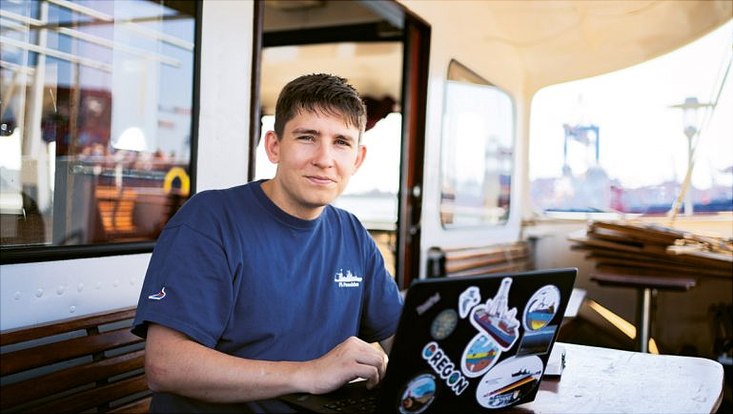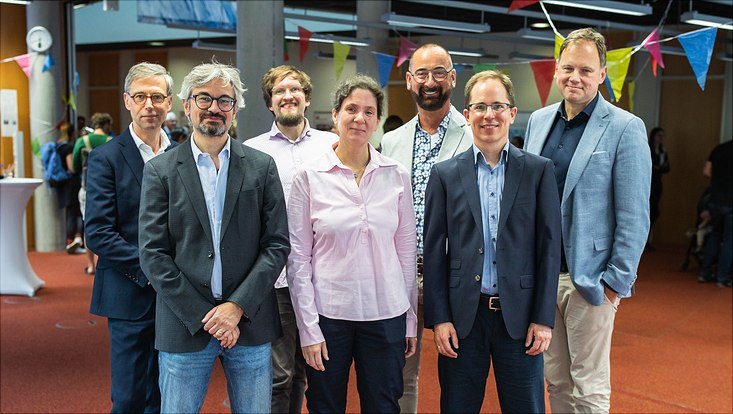Conversation between Nobel Prize winner Prof. Dr. Klaus Hasselmann and Prof. Dr. Dr. h.c. Dieter Lenzen, president of the University“I hope that young people succeed where we scientists have not.”
25 October 2021, by Newsroom editorial office
Just over 3 weeks ago, the Swedish Nobel Prize committee announced that Hamburg resident Klaus Hasselmann had been awarded this year’s Nobel Prize in Physics. On the occasion of Dr. Hasselmann’s 90th birthday, the University’s president, Univ.-Prof. Dr. Dr. h.c. Dieter Lenzen, invited the alumnus and former professor of Universität Hamburg for a talk. He was accompanied by his wife, Susanne Hasselmann-Barthe, 85.
Dieter Lenzen: Of course, in the wake of the announcement that you were awarded this year’s Nobel Prize in Physics, much has already been written about you. For your 90th birthday, I would like to focus on Klaus Hasselmann, the person. How did you become who you are? Perhaps it has to do with your childhood and what preoccupied you early on. For example, I read that you grew up in Great Britain because your father was persecuted by the Nazis. Is that because he was a Social Democrat?
Klaus Hasselmann: Yes. He was not directly persecuted; rather, he wanted to dodge the National Socialists and left in good time.
Lenzen: You lived in London?
Hasselmann: Thirty kilometers north of London, in a very beautiful garden city, Welwyn Garden City.
Lenzen: How old were you when your family moved there?
Hasselmann: I was 3 years old.
Lenzen: Can you remember the time before that? That is just about that age, of course, that memory kicks in.
Hasselmann: No, I cannot. My memories begin with England, where I grew up as a German—I wasn’t nationalized. I felt very comfortable there.
Lenzen: Although Germany was enemy territory for the English, they accepted you?
Hasselmann: Yes, I was very happy about that! I had no problems whatsoever; people completely accepted me. I went to school there like an English person and later, back in Germany, I first had to learn German—for example, to distinguish between “Du” and “Sie.”
Lenzen: Were you already interested in physics in England during your time at school?
I have long been interested in natural changes in the climate and how things are influenced by human beings.
Hasselmann: Yes! I have always been interested in that. However, we had a physics teacher who didn’t like me, and I didn’t like him either. So I learned physics independently of that teacher and school— simply because it interested me.
Lenzen: I can completely understand that. I also had a physics teacher I didn’t like. However, I cannot say that he didn’t like me—he didn’t even know me! I always liked it when the room was darkened for experiments, because then I could think about other things—and wouldn’t be seen. How did you still manage to stick with physics?
Hasselmann: I was simply interested in how nature works. I read books at home and made things. For example, as a schoolboy, I built my first crystal radio with which I could listen to radio signals.
Lenzen: Did detectors later play a role in your work?
Hasselmann: No, they were just an introduction.
Lenzen: When did you return to Germany?
Hasselmann: We returned to Hamburg in 1949. I finished secondary school while still in England.
Lenzen: What was your best subject?
Hasselmann: It was actually physics. But I was also quite good at English and geography.
Lenzen: Do you have siblings?
Hasselmann: Yes, a sister who is 3 years older and who was a teacher and 2 brothers 7 years younger—twins. One of them also did physics and the other was an architect.
Lenzen: Did your parents raise you differently—for example, were they stricter with you, as one of the older children, than with your younger brothers?
Hasselmann: My mother was quite ill, which is why I took care of my younger brothers. Fortunately, we all got along very well.
Lenzen: When you returned to Hamburg in 1949, did you begin to study immediately?
Hasselmann: No. First, I did an internship in mechanical engineering. At the time, I wasn’t entirely sure what I wanted to become.
Lenzen: So becoming a professor was not your initial thought?
Hasselmann: No, I didn’t initially plan that; it just happened.
Lenzen: Then you began to study physics . . .
Hasselmann: Physics and mathematics. I quickly found friends there, which helped me feel comfortable in Germany.
Lenzen: And this is when your interest in your later research area took hold?
Hasselmann: That came later. I was first interested in ocean swells, wind, and waves. I developed measurement programs for these.
Lenzen: You have to presume that I understand nothing about what you did or still do. But perhaps to make things easier: How do you measure waves?
Hasselmann: With rods. By putting several next to each other, you can measure the length and height of waves.
Lenzen: And thus make predictions?
Hasselmann: Yes, we also did that. When long, large waves come in from the Atlantic and the wind whips them up in the North Sea, they can get very strong. And you can predict that. To do so, you need to measure wind development and wave development in good time.
Lenzen: You also worked on climate change quite early on. How did this come about?
Hasselmann: I had long been interested in natural changes in the climate and how things are influenced by human beings. In the mid-1970s, I began to take series of measurements—also inspired by the 1972 Club of Rome publications.
Lenzen: In addition to your studies, you also taught as a professor. What would you say makes a good university teacher?
Hasselmann: I can only say what you shouldn’t do. I always shirked my responsibilities and looked for topics which would attract as few students as possible so that I could give that up as soon as possible. So I was the epitome of the bad professor. However, I worked together with students in research, and that was fun!
Lenzen: What kind of researcher are you then? More of a loner?
Hasselmann: That’s pretty much what I would say. On the other hand, I always had fun working on measurement projects with other researchers.
Lenzen: Did you also meet your wife in this context?
Susanne Hasselmann-Barthe: No, we met each other in a choir.
Lenzen: You sing?
Hasselmann: Yes. Not well, but I still do it.
Lenzen: But you don’t play an instrument, do you?
Hasselmann: I do— the flute, but also not particularly well. My wife always makes me practice if we want to play together.
Lenzen: It is phenomenal that you have already been married for 64 years. What’s your secret?
Hasselmann: A very patient woman.
Lenzen: Does it take patience, then, to live with you?
Hasselmann: You should ask my wife. I personally find myself quite charming. (laughs)
Hasselmann-Barthe: We used to fight quite a bit. Then it dawned on my husband that he just had to be charming when I was angry. And I fell for it every time. (both laugh)
Lenzen: You, dear Ms. Hasselmann-Barthe, also worked in academia.
Hasselmann-Barthe: Yes. For a time, I took care of the family, and then I started again.
Lenzen: Was it difficult to go back?
Hasselmann-Barthe: Absolutely. And many professors also told me that about other women: that returning women first needed to be encouraged to really start again. My husband encouraged me.
Lenzen: And how did you decide on mathematics? That was unusual for a young woman, particularly at that time.
Hasselmann-Barthe: I just liked math at school, but I lacked the confidence at first. During a career counseling session, I was told that if that were my only reason for not doing it, I should definitely study it.
Lenzen: And that turned out to be the right decision. Just as your husband’s chosen research field was for him, seemingly—at least, the Nobel Prize committee thought so. What exactly led to your award?
Hasselmann: Actually, I am not exactly sure. But I think that I was awarded the prize because I showed how human beings change the climate. That climate research is not an abstract science but is directly connected to us.
I am optimistic that we can and will switch to renewable energy.
Lenzen: What would you say, then? Which scenario is most likely for the next 30 to 50 years? Prof. Stammer, the director of the Center for Earth System Research and Sustainability at our University, has already revealed a few things. But in your eyes, do these prognoses mean a whole new life?
Hasselmann: In this case, I see the interplay of politics and science in the foreground— that is, how politicians respond to what scientists have been saying for years. I am personally optimistic that we can and will switch to renewable energy, and we will then be able to get a handle on the problem. How do you see it?
Lenzen: I think that we, as Germans, should not overestimate our ability to solve all of the world’s problems on our own. We often hear, “The Germans have to take the lead; they have to be a role model.” When being German is associated with being a role model, I am always somewhat cautious. We already had this ambition once. With regard to addressing climate change, well, I’m no expert. I think, however, that it is a question of awareness and the job of an educational system to make clear to people that life cannot simply continue as it has. I can imagine that there will be major conflicts in the upcoming years over money and that things might fail due to that. So I am a bit more skeptical than you are.
Hasselmann: The problem is undoubtedly that we’re not used to thinking long-term. You can motivate people to do something for the next few months, but it is hard to communicate something that has to develop over the next 10, 20 years. I am relying on the younger generations who are perhaps in a position to find better language to inspire people to tackle problems. But I am fairly optimistic that young people, such as the Fridays for Future movement, will manage what we stubborn scientists did not.
Lenzen: You live here in an apartment in Hamburg. Do you also live in a climate-friendly way?
Hasselmann: We do as well as we can.
Hasselmann-Barthe: We also have a small row house on Sylt. There, we have geothermal energy and an electric car, and we don’t fly when we go on vacation.
Lenzen: When I recently met you, Mr. Hasselmann, on the occasion of the announcement of the award, you said you still had a crazy idea that you wanted to realize. This is what most interests me: scientists who like nonsense. What is your idea?
Hasselmann: I am convinced that we can completely rethink physics, that we can transcend the duality of particles and waves, and that we can leave quantum physics behind. Experts think I’m crazy.
Lenzen: There is, of course, a Nobel Prize winner who received 2 Nobel Prizes. That should be your goal!
Hasselmann: Yes, that will be my future Nobel Prize! (laughs)






